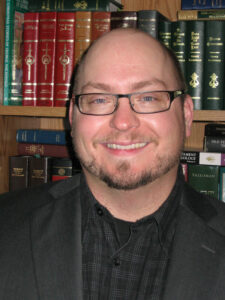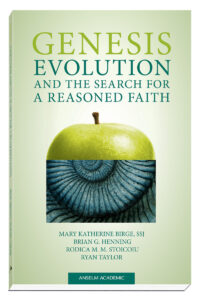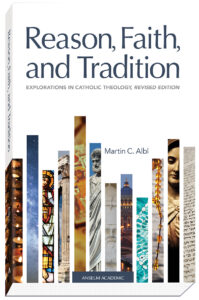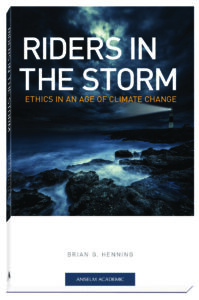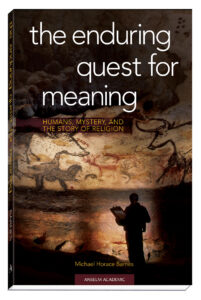Science and Religion
Beyond Warfare and Toward Understanding
About This Book
Overview
What happens when religious faith meets scientific facts?
Many believe that conflict defines the relationship between science and religion, especially the Christian religion. But the war between faith and science is a myth—a very popular myth—that has endured for too long.
By investigating the root of this myth and reexamining its classic stories, Science and Religion: Beyond Warfare and Toward Understanding offers a more accurate relationship between science and religion. With a focus on Christianity, the text explores causes of contemporary conflicts as well as cases in which science and religion have interacted in mutually beneficial ways to demonstrate that, in the relationship between science and religion, harmony is more common than discord.
Details
| Weight | 1 lbs |
|---|---|
| Dimensions | 6 × 1.5 × 9 in |
| Format | Softcover |
| Print ISBN | 978-1-59982-715-5 |
| Pages | 318 |
| Item # | 7071 |
|---|
Customer Reviews
I have not read, and cannot imagine, a better introduction to the science and religion dialogue than this book. If you are looking for a primer that is comprehensive, scholarly, readable—and will be engaging for students—look no further.
“One of the many virtues of Joshua Moritz’s well-structured and wide-ranging introduction to the relation between science and religion is its resourceful use of historical scholarship.”
“Joshua Moritz’s Science and Religion is a stunning contribution to the dialogue between the scientific and religious communities, laced with enormous scholarship and marvelous humor, and driven by a passion to put aside the reported conflict and contribute to creative interaction. Moritz first argues that the purported warfare between science and religion is actually a myth propounded by a collection of outspoken, antireligious scientists. He then provides a detailed and promising assessment of several key areas, including Big Bang cosmology, evolutionary biology and creation theology; the human person and the image of God; science and miracles; God’s relation to suffering in nature; and the far future of the cosmos and Christian hope. I strongly recommend Science and Religion to both the general reader and the scholarly community. It is a must-read for scientists, religious scholars, high school teachers, clergy, and the general public interested in the possibility of a creative interaction between science and religion.”
“Joshua Moritz’s Science and Religion dispels the myth of the conflict between religion and science by showing that no science can be done without some important presuppositions and that any good theology incorporates the best results of scientific investigation. The book covers all key topics in science-religion conversation from the beginning to the end. Listing of resources and a glossary further strengthen this book’s value.”
Table of Contents
Contents
Chapter 1: Science versus Religion: The War That Never Was
Chapter 2: The Role of Faith in the History of Science
Chapter 3: The Boundaries and Limits of Science and Faith
Chapter 4: Where the Conflict Really Lies: Science and Faith without Limits
Chapter 5: Creation and the Cosmos
Chapter 6: The Forming of Life: From Cosmic Dust to Consciousness
Chapter 7: From Consciousness to New Creation: The Nature and Destiny of Humanity
Chapter 8: Miracles and the Laws of Nature
Chapter 9: God, the Problem of Suffering, and the Natural Sciences
Chapter 10: The End of All Things and the New Beginning
Professional Reviews
Peter Jordan is Research Coordinator at the University of Oxford.
Date of Review 8/21/2019
Winona, MN: Anselm Academic , January 2016. 318 pages.
$31.95. Paperback. ISBN 9781599827155. For other formats: Link to Publisher’s Website.
Review
A friend once told me that when teaching her university courses, she typically keeps the best book on the topic for herself to guide her instruction on the topic, and assigns the second-best one to her students. Although it would be a great shame to keep Joshua Moritz’s Science and Religion: Beyond Warfare and Toward Understanding from students, the book does such a good job of introducing readers to current questions and debates in the field that it would be entirely understandable if many teachers of the subject—especially those not already familiar with the extensive and ever-growing scholarly literature—decided to keep it for themselves.
Science and Religion could also have been called Science and Christianity, given that it deals almost exclusively with Christian theological ideas. The specificity of its focus on a particular religious tradition, rather than on religion-in-general (whatever that may be), may reduce the book’s appeal to some audiences. Yet for those who care about Christianity’s relationship to science, such specificity allows for a depth of examination and exploration that would not otherwise be possible.
The ten chapters of the book are loosely divided into two groups. The first four chapters look at what Moritz calls the “much-disputed borderlands” (10) between science and religion, primarily through historical and philosophical lenses. The historical material is largely taken from the detailed work done in recent decades by historians of science, work that cumulatively has shown that past Christianity-science relations are more complex than at first seems to be the case, and that they almost never fit neatly into the popular but mythical stories about inevitable conflict that have circulated since the 19th century. On the basis of this historical scholarship, as well as astute philosophical analysis of the boundaries and limits of science and faith, Moritz concludes the first part of the book with the claim that whatever tension or conflict does arise between the two is more often than not the product of one (or both) reaching beyond their proper limits; in the case of science this means scientism, while for Christianity it means fideism. This identification of an “essence” of the tensions between Christianity and science is a little surprising from someone who clearly eschews historical and philosophical essentialism and embraces a complexity perspective (85). Yet Moritz is doubtless right that in many cases scientism and/or fideism do induce stresses and strains in relations between the two.
Chapters 5 through 10 address particular contemporary sites of interaction and contestation between theological ideas and scientific theories: cosmogony and cosmology; the origins of life; the nature and destiny of humanity; miracles and laws of nature; creaturely suffering and theodicy; and the destiny of the cosmos. Moritz does a uniformly excellent job of judiciously selecting and summarizing key aspects of the literature on each topic, and at points, he brings his own original scholarship into the mix. The extensive footnotes and suggested readings for further study in each chapter are valuable for those not already familiar with relevant literature on each topic.
For those who think Christianity’s relationship with science need not be one of unavoidable conflict, the second part of the book is rewarding in that it displays one person’s view of the kind of Christianity that might steer clear of protracted discord. Moritz sees Christianity as an active tradition of reflection, one that draws on past insights but which is also not stuck in the past. It robustly engages with all facets of human endeavor and knowledge, including science, and it does not shy away from modifying its ideas and practices in light of science. This kind of Christianity is modelled by many of the sources on which Moritz draws and which he cites in the book: key early Christians including Irenaeus, Basil, and Augustine; contemporary scientifically-informed theologians such as Robert John Russell (co-editor of a number of books with Moritz, and director of the Center for Theology and the Natural Sciences at the Graduate Theological Union where Moritz received his doctorate), John Polkinghorne, Nancey Murphy, and William Stoeger; analytically-inclined philosophers of religion—figures like Richard Swinburne, Michael Murray, Michael Rea, and Thomas Tracy—who have pondered the bearing that scientific issues and ideas have on the faith; and others. Moritz thereby locates himself in a long line of Christian thinkers for whom open and honest engagement with worldly learning is embraced.
If Moritz’s theological engagement with science in the second part of the book has any unique characteristics in contemporary science-and-religion engagement, it is perhaps his consistent focus on the Bible. For example, in contrast to Catholic theological engagements with science—ones in which canonical figures like Thomas Aquinas and magisterial texts from the Catholic intellectual tradition together guide how interaction between Christian theology and scientific ideas and concepts should proceed—Moritz prefers to work as directly, and in as unmediated fashion as possible, with Christianity’s scriptures. He frequently draws on Hebrew and Greek translations of texts to support preferred construals of key Christian claims, and unpacks the relationships between those claims and the relevant aspects of science. While broadly orthodox in character, the vibrant Christianity Moritz depicts in the bookis shaped by arguably more Protestant than Catholic or Orthodox attitudes toward the Bible.
Even if one doesn’t share all of Moritz’s theological commitments, anyone interested in an historically informed, philosophically sophisticated, and theologically and scientifically rich examination of Christianity-science relations will learn much from Science and Religion: Beyond Warfare and Toward Understanding. Through his mapping of one significant region of the intellectually challenging and highly contested terrain of science and religion, Moritz has done teachers of the subject—and their students, if they can get their hands on it—a great service.
About the Author:
Joshua M. Moritz is Lecturer of Philosophical Theology and Natural Science at the Graduate Theological Union in Berkeley and Adjunct Professor of Philosophy at the University of San Francisco.
University of Oxford
Science and Religion: Beyond Warfare and Toward Understanding. By Joshua M. Moritz.
Winona, MN: Anselm Academic, 2016. Pp. 317. $30.95.
I have not read, and cannot imagine, a better introduction to the science and religion dialogue than this book. If you are looking for a primer that is comprehensive, scholarly, readable—and will be engaging for students—look no further.
The first four chapters of the book provide a solid foundation in the history and philosophy of the relationship between religion and science. M. hits all the major flash points (such as Columbus, Galileo, and others), debunking the warfare myth from every conceivable angle. Six subsequent chapters take the reader into key areas of interaction between religion and science.
Historically and philosophically, scientifically and theologically, the erudition in the book can only be described as massive. Footnotes from Church Fathers sit side by side with footnotes on the latest scientific research and contemporary theological discussion. Yet the book is still easy to read. No one will get lost in jargon here.
Chapter 6 is a good snapshot of the book’s method. M. begins with a detailed linguistic and thematic analysis of what the Bible means when it speaks of God creating. He follows with a detailed scientific analysis of evolutionary biology—including some intriguing findings in evolutionary developmental biology that will call to mind discussions of “cosmological fine-tuning.” Every detail is put to work in showing that there need not be a conflict between creation and evolution from either a religious or a scientific perspective. Chapters on cosmology, human uniqueness, miracles, suffering, and the end of the world all unfold with similar detail and aim.
But M. does not stop with great research and approachable writing. He has also packed the book with discussion questions that are genuinely synthetic, suggested 536 Theological Studies 78(2) readings for those who want to dive deeper, and internet resources for those who want to see related videos. With these features, the book has everything you need for a semester long course on science and religion.
M. not only demystifies the warfare myth, he invites the reader to experience the intellectual and spiritual satisfaction that come from developing a more cordial relationship between religion and science.
Kenrick-Glennon Seminary, St. Louis



